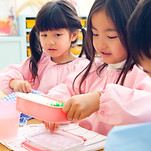Social-Emotional Development
When children feel connected, capable, and understood, they’re free to learn with confidence and joy. Social-emotional readiness means more than just “getting along with others”—it’s about helping children understand their feelings, express themselves, and build meaningful relationships. With support, they grow in empathy, communication, and cooperation, developing the skills that allow them to participate in group settings with a sense of belonging. As they learn to manage their emotions and impulses, take initiative, and recover from setbacks, children build resilience, independence, and a strong foundation for both academic and lifelong success.

Emotional Awareness Skills
When children are supported in understanding their emotions and recognizing their strengths, they become more confident and resilient. As they learn to name and manage their feelings, they’re better able to express themselves, take healthy risks, and recover from challenges. Developing self-awareness helps children build a strong sense of identity and belonging—key ingredients for motivation, growth, and joyful learning.

Independence Skills
When children see themselves as capable problem-solvers, they begin to take initiative, explore with curiosity, and approach challenges with confidence. They learn to meet their own needs, seek help when necessary, and make use of the strategies and tools around them. These skills build a strong sense of independence, empowering children to navigate both learning and daily life with growing autonomy and resilience.

Social and Community Participation Skills
With support, modeling and reflection, children can grow their capacity for empathy, communication, and collaboration. As they practice taking turns, listening to others, and navigating social situations, they begin to feel more connected to their peers and confident in group settings. These developing social skills lay the groundwork for meaningful friendships, cooperative play, and a sense of community both inside and outside the classroom.

Self-Regulation Skills
When children are supported in building self-regulation skills, they become more capable of managing their attention, emotions, and impulses—especially during transitions or exciting moments. With consistent guidance and the right tools, they learn to pause, think, and respond with growing confidence. These developing skills help make classroom routines feel more predictable and empowering, allowing children to engage more fully and thrive in their learning environment.
